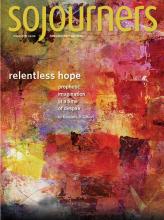WHEN I WAS A YOUNG, green, pre-tenured professor, I joined Anna Carter Florence, the Peter Marshall Professor of Preaching at Columbia Theological Seminary, and the eminent Old Testament scholar Walter Brueggemann on an academic panel about preaching. I had accepted the invitation to participate only a month before; two other panelists had canceled, and I’d been tapped to stand in as a substitute.
Walking into the standing-room-only conference hall, I was elated and anxious. Respected biblical scholars and experts in the art of preaching lined the walls; over-eager doctoral students had secured front-row seats. In this sea of spectators, I knew not to flatter myself: Most had come to hear Professor Brueggemann. Though I had never had any prior formal acquaintance with this sage of biblical scholarship, I had spent nearly five years in my doctoral program in conversation with his work on the prophets, including his popular and widely influential The Prophetic Imagination, published in 1978—only four years after my birth.
I listened to my co-panelists’ presentations. Then, not long before I had the floor, my purpose became clear: I had not come to pay obeisance to veteran scholars. I was there to realize my own voice and declare my own contribution to the conversation. And though I had been deeply shaped by Brueggemann’s work, his scholarship on the prophetic voice had sparked new questions I needed to answer.
Read the Full Article

